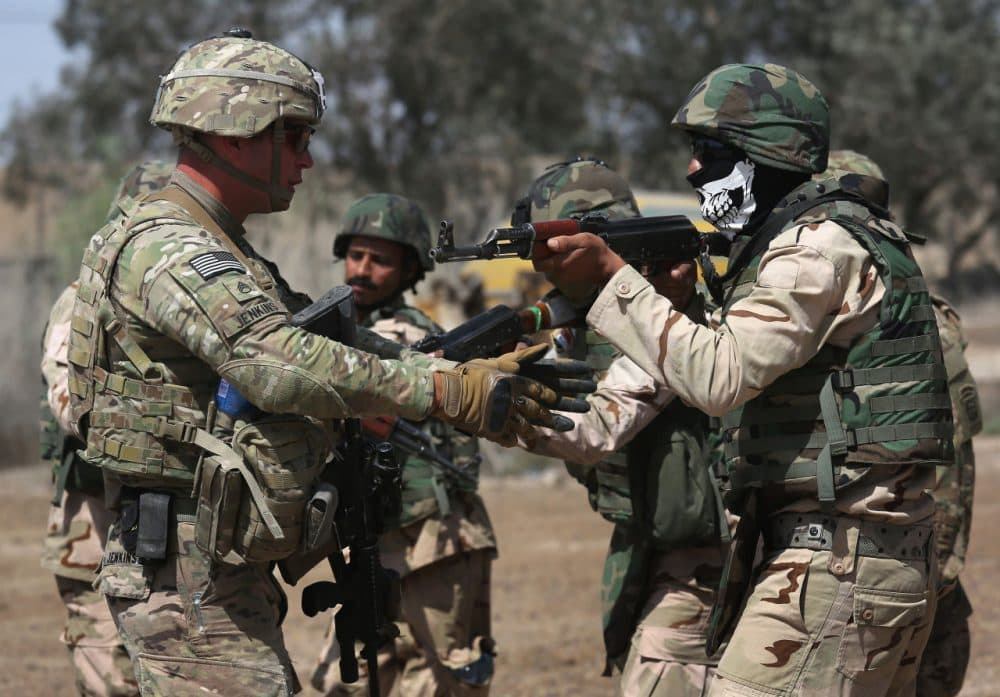Advertisement
Military Analyst Andrew Bacevich On Iraq, ISIS

As the U.S. led fight against ISIS continues in Iraq, Here & Now starts a series of segments about how that war is going and the role the original U.S. invasion of Iraq plays in the current fight. Here & Now's Jeremy Hobson speaks to a former Bush administration official who supported the previous war, a journalist who covered it and a Marine who fought in Iraq. The series starting Monday features Andrew Bacevich, a military analyst who opposed the war from the start.
Interview Highlights: Andrew Bacevich
On how U.S. actions lead to the rise of ISIS
"When the George W. Bush administration decided to go into Iraq to overthrow Saddam Hussein, it did so with the expectation that removing Saddam would somehow, not simply pacify Iraq itself, but lead to some broader benefits in terms of calming the situation in the region, and I think the rise of ISIS as the new threat really is the ultimate demonstration of the American failure in the previous Iraq War.”
On why ISIS exists
“The reason ISIS exists is because the George W. Bush administration introduced U.S. forces into Iraq in the first place. More broadly, our Iraq War, or 'Bush’s Iraq War,' broke Iraq, ended its stability. The Iraqi government we've created, the Iraqi army that we’ve created has proven itself unable to cope with the instability we created. ISIS is simply a symptom, or a manifestation of that instability.”
"The Iraqi government we've created, the Iraqi army that we’ve created has proven itself unable to cope with the instability we created. ISIS is simply a symptom, or a manifestation of that instability."
Andrew Bacevich
On whether the U.S. prepared Iraqi troops to fight ISIS
“Any effective fighting force is effective if it can claim two qualities: The one quality is the capacity to fight — the skills, the weaponry, the wherewithal. But the second quality is the will to fight. We spent several years building up this new Iraqi army, and I’m not frankly in a position to question whether or not the training was adequate, or whether we provided them with sufficient arms. My sense is that we did a lot in that arena, but I'm not sure we ever had the ability to inculcate that will to fight to persuade young Iraqi men that the nation of Iraq, the state that we created, the government apparatus we created was worth fighting and dying for. So the argument that the current mess is Obama’s fault, seems to me has merit only if the people making that argument are also willing to argue that we should have stayed in [Iraq] far longer than we did with a far greater military presence. And frankly there was no willingness on the part of the American people to undertake that endless occupation.”
On what American military leaders should do now
“We need to begin by making a sober and realistic assessment of exactly what sort of threat we're facing. And I think the most important point to recognize is that what we’re facing, as vile and as vicious as ISIS clearly is, it doesn’t represent an immediate threat to the United States of America. It has no air force, it has no navy, it has a relatively small army, no weapons of mass destruction, no ability to project power across the ocean to threaten the United States. And so we need to have a sober appreciation of exactly what they are able to do. Now that said, ISIS does represent a profound threat to the region. And it seems to me that recognizing that should lead us to examine more carefully whether or not there are actors within the region who have a greater interest than we do in taking up this fight and who may have the capacity to do so. In other words, this is a burden that should be borne by nations within this region that do not wish to see this supposed new caliphate succeed."
"[The fight against ISIS] is a burden that should be borne by nations within this region that do not wish to see this supposed new caliphate succeed."
Andrew Bacevich
On how the U.S. should address threats from ISIS
“I would want to push back against the notion that doing something necessarily means doing something militarily. I push back on that because it seems to me that the historical record over the past several decades is quite clear. There's a historical record that shows that U.S. military involvement in the region simply does not work. When we intervene, directly or indirectly, the result is not greater stability, it’s greater instability. And therefore, the question ‘what should we do?’ seems to me should spur us to think creatively, about non-military means to address this military threat.”
On actions Bacevich would support
“I would support President Obama announcing tomorrow that the Unites States recognizes the failure of its effort to re-stabilize the greater Middle East by relying on U.S. military power. In other words, that he indicated the direction of U.S. policy henceforward will be towards reducing our military footprint, reducing our military obligations to the region.”
Guest
- Andrew Bacevich, professor of international relations and history at Boston University's Pardee School of Global Studies.
This segment aired on July 6, 2015.